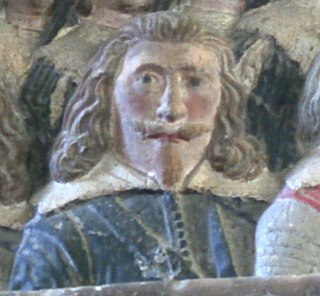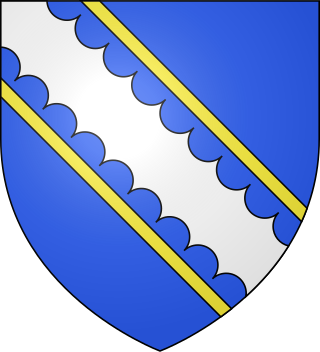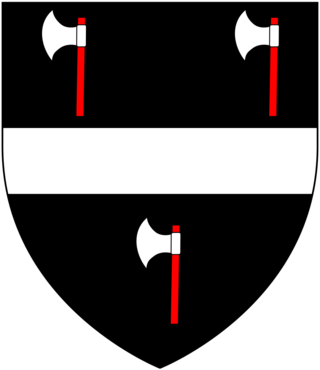
William Strode was an English politician who sat in the House of Commons variously between 1624 and 1645. He was one of the Five Members whose impeachment and attempted unconstitutional arrest by King Charles I in the House of Commons in 1642 sparked the Civil War, during which he fought on the Parliamentarian side.

Colonel John Dyke Acland, of Tetton and Pixton in Somerset, was Tory Member of Parliament for Callington in Cornwall and fought in the American War of Independence in 1776.

Sir Hugh Acland, 5th Baronet was an English Member of Parliament, from a family of Devonshire gentry. He obtained a confirmation of the family baronetcy in 1678, and served as a Member of Parliament for two boroughs in Devon in 1679 and from 1685 to 1687. Never very active in national politics, he was one of the many Tories estranged by James II's pro-Catholicism, but remained a Tory after the Glorious Revolution. He continued to hold local office in Devon off and on until his death in 1714, when he was succeeded by his grandson.

The Militia Ordinance was passed by the Parliament of England on 15 March 1642. By claiming the right to appoint military commanders without the king's approval, it was a significant step in events leading to the outbreak of the First English Civil War in August.

Sir Charles Thomas Dyke Acland, 12th Baronet, DL, JP, of Killerton in Devon and of Holnicote in the parish of Selworthy in Somerset, was a large landowner and a British politician and Barrister-at-Law. He was known to family and friends as "Charlie", but demanded to be known in public as "Sir Thomas", not only because that was the traditional name of the Aclands, there having been a "Sir Thomas Acland" at Killerton for 170 years, but also because following the creation of a second and much newer Acland Baronetcy in 1890, for his uncle Sir Henry Wentworth Acland, 1st Baronet, he wished people to know "which was the real head and owner of Killerton".
Francis Leigh, 1st Earl of Chichester was a Royalist politician and courtier around the period of the English Civil War.

Sir John Acland, 1st Baronet of Acland in the parish of Landkey and of Columb John in Devon, England, was a Royalist commander in the Civil War, during the early part of which he maintained a garrison for the king on his estate of Columb John. He was created a baronet in 1644 for his support, but the letters patent were lost or never finalised and the dignity was not confirmed until 1677/8, long after his death. He compounded with Parliament for his estate in 1646 and died the following year.

Henry Bourchier, 5th Earl of Bath of Tawstock in Devon, was an English peer who held the office of Lord Privy Seal and was a large landowner in Ireland in Limerick and Armagh counties, and in England in Devon, Somerset and elsewhere. Following his inheritance of the Earldom of Bath from his distant cousin, in 1637 he moved from his native Ireland to Tawstock Court in Devon, a county previously unknown to him where he knew few people. As the most senior resident nobleman in the county he was destined to play the leading role for the Royalist cause in Devon during the Civil War but before the outbreak of hostilities, he was captured in 1642 and imprisoned by the Parliamentarians before he had organised his local forces. In the opinion of Clarendon he was a man of "sour-tempered unsocial behaviour" who "had no excellent or graceful pronunciation" and "neither had or ever meant to do the king the least service".

Sir John Acland of Columb John in the parish of Broadclyst, Devon, was an English knight, landowner, philanthropist, Member of Parliament and Sheriff of Devon. He was one of John Prince's Worthies of Devon.

Sir Faithful Fortescue (1585–1666), of Dromiskin in County Louth, Ireland, was Governor of Carrickfergus in Ireland, long the chief seat and garrison of the English in Ulster and was a royalist commander during the English Civil War.

Sir William Strode (1562–1637) of Newnham in the parish of Plympton St Mary, Devon, England, was a member of the Devon landed gentry, a military engineer and seven times a Member of Parliament elected for Devon in 1597 and 1624, for Plympton Erle in 1601, 1604, 1621 and 1625, and for Plymouth in 1614. He was High Sheriff of Devon from 1593 to 1594 and was knighted in 1598. In 1599 he was appointed Deputy Lieutenant of Devon. There is a monument to him in the parish church of Plympton St Mary.

Sir John Davie, 1st Baronet (1588–1654) of Creedy in the parish of Sandford, near Crediton, Devon, was a member of the Devonshire gentry and served as Member of Parliament for Tiverton in 1621-2 and as Sheriff of Devon (1629–1630). He was created a baronet in 1641.
Thomas Southcote MP DL JPof Buckland was an English landowner and politician who sat in the House of Commons from 1661 to 1664.

Colonel John Giffard (1602–1665), of Brightley in the parish of Chittlehampton, Devon, England, was a Royalist leader during the Civil War. Giffard commanded the Devon Pikemen at the Battle of Lansdowne in 1643, in which his 3rd cousin the Royalist commander of the Cornish forces Sir Bevil Grenville (1596-1643) was killed in heroic circumstances. Giffard's loyalty to the Royalist cause led to him being proposed in 1660 as a knight of the intended Order of the Royal Oak. He was personally known to the biographer John Prince (1643–1723) who included him as one of his Worthies of Devon. He was buried in Chittlehampton Church, where his small kneeling effigy survives on the base of the monument he erected in 1625 to his grandfather.

Sir Arthur Acland (1573–1610) of Acland in the parish of Landkey, Devon, was a member of the Devonshire gentry, and was knighted in 1606. Little is known of his life and career, but his monumental inscription survives above his monument in Landkey Church. His son was Sir John Acland, 1st Baronet. He was ancestor to the prominent, wealthy and long-enduring Acland family of Killerton, which survives today in the direct male line.

Sir William Wrey, 2nd Baronet of Trebeigh, St Ive, Cornwall and North Russell, Sourton, Devon, was MP for Liskeard, Cornwall in 1624.

Sir Chichester Wrey, 3rd Baronet (1628–1668) of Trebeigh in the parish of St Ive, Cornwall and of North Russell in the parish of Sourton, Devon, was an active Royalist during the Civil War and was Colonel of the Duke of York's Regiment and served as Governor of Sheerness.

Columb John in the parish of Broadclyst in Devon, England, is a historic estate that was briefly the seat of the prominent Acland family which later moved to the adjacent estate of Killerton.

Southcott is a surname of an ancient and prominent family from the English counties of Devon and Cornwall.















